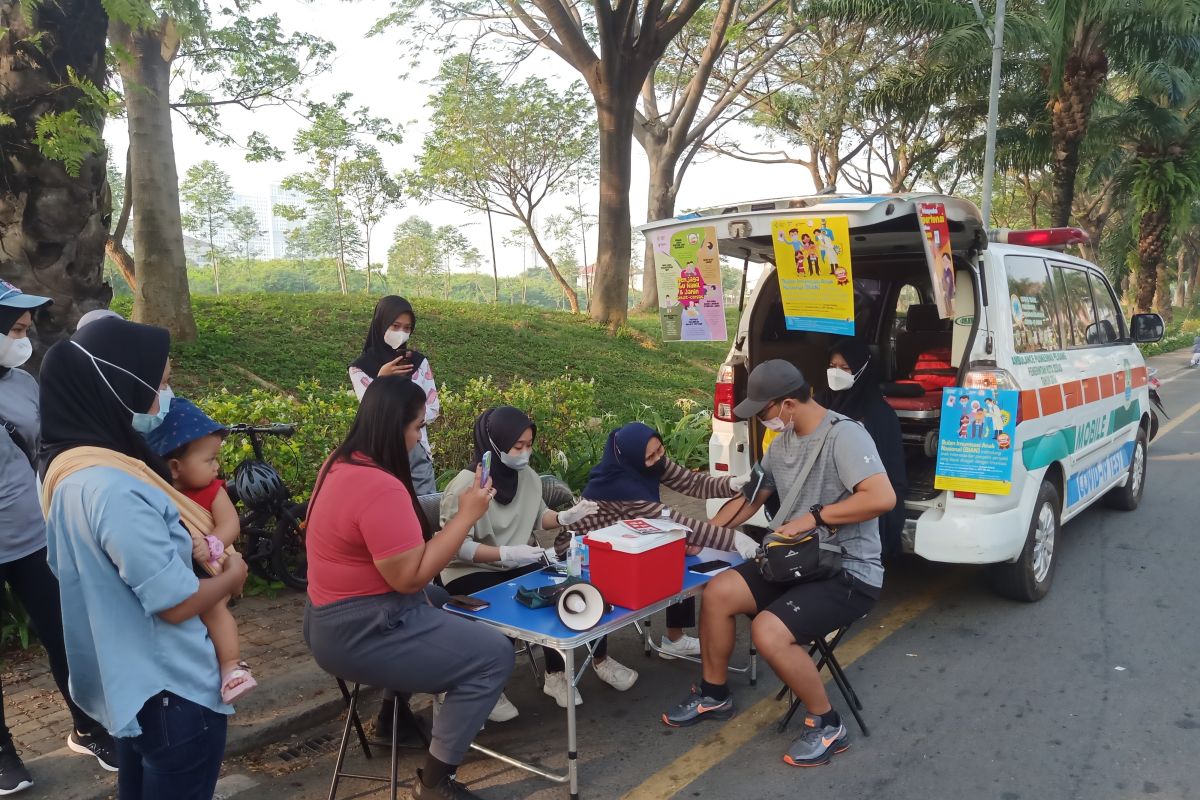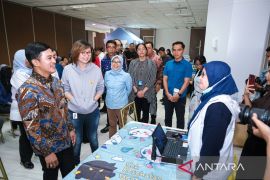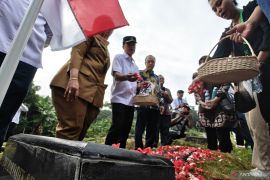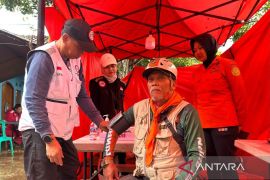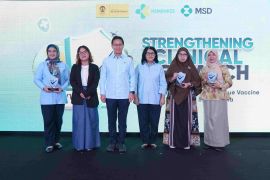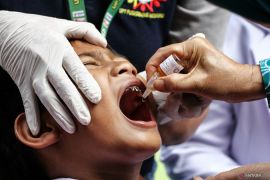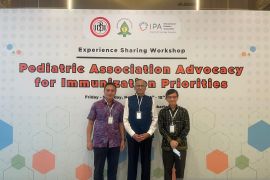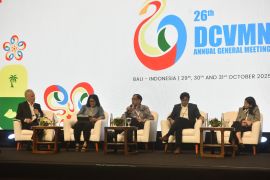This death tally does not include 386 other health workers, whose time of death was unknown.
The number of deaths was the highest among doctors, reaching 751, followed by 670 nurses and 398 midwives.
The rest of the 80 people comprised medical laboratory technology experts, pharmacists, dentists, radiologists, dental therapists, sanitarians, pharmacists, ambulance workers, electromedics, epidemiologists, entomologists, and medical physicists.
The rising trend of fallen health workers started since the March-May 2020 period, with 36 cases, and thereafter, the tally rose to 165 in January 2021 and hit its peak, at 502 cases, in July 2021 that coincided with the emergence of the delta variant.
The number of health workers succumbing to the disease is concentrated in East Java, with 646 cases; West Java, 225 cases; DKI Jakarta, 194 cases; and Central Java, 193 cases.
The rest are spread across North Sumatra, Banten, South Sulawesi, East Kalimantan, Riau, South Kalimantan, Lampung, Aceh, and Yogyakarta.
This situation affects the mental and physical state of health workers. The mental health of these workers is affected by the increasing working hours as well as pressure and anxiety over contracting the coronavirus disease from patients.
Cross-sectional survey data shows that half of the 1,257 health workers, who treat COVID-19 patients in China, suffer from depression and anxiety disorder, or what is known as burnout syndrome.
The researcher team from University of Indonesia highlighted that 83 percent of health workers in Indonesia experience a similar phenomenon, with moderate to severe degree, which affects the stability of public services in hospitals.
At the end of July 2022, the COVID-19 pandemic situation in Indonesia had shown an upward trend once more based on the rate of confirmed cases, active cases, death count, and hospital occupancy.
Based on the Health Ministry's daily report as per Sunday, the count of confirmed cases rose three folds since the start of July 2022, from two thousand to more than six thousand cases.
The daily death count rose by 10 people, on average, within the last few days.
The average weekly positive cases also reached 6.07 percent, which is above the five-percent threshold set by the World Health Organization (WHO), within the last three weeks.
The number of health workers, who died, also increased once again, with the average being one to three people during the March-July 2022 period.
This serves as an alarm call for related authorities to immediately activate an effective protection system in health service facilities.
Related news: Jakarta targets 700 thousand health workers to receive second booster
Related news: Fourth dose rollout after third dose coverage touches 50%: ministry
Vaccine protection
Nobody wants the tragedy in July 2021 to recur.
Based on this experience, various health profession organizations encourage the Health Ministry to immediately develop a system to protect health workers by recommending to take the second booster vaccine dose.
This recommendation came from the Indonesian Doctor Association (IDI), Indonesian Nurse Association (PPNI), to the Indonesian Technical Advisory Group on Immunization (ITAGI).
On July 28, 2022, the ministry issued Circular Letter No. HK.02.02/C/ 3615 /2022 addressed to all regional heads in Indonesia to organize the administration of second booster vaccination.
The vaccination targets 1.9 million health workers, starting from July 29, 2022.
The second booster dose regime for health workers that can be used came in the form of a homologous or heterologous platform.
This comprises the first booster dose of Sinovac that uses half dose or 0.25 ml of AstraZeneca, half dose or 0.15 ml of Pfizer.
In addition, the full dose or 0.5 ml of Moderna, full dose or 0.5 ml of Sinopharm, and full dose or 0.5 ml of Sinovac.
For the Astra Zeneca first booster dose recipients, the recommended second booster dose comprises half dose or 0.25 ml of Moderna, half dose or 0.15 ml of Pfizer, full dose or 0.5 ml of AstraZeneca.
For the Pfizer first booster dose recipients, the recommended second booster dose comprise full dose or 0.3 ml Pfizer, half dose or 0.25 ml Moderna, full dose or 0.5 ml of AstraZeneca.
Meanwhile, Moderna single dose booster recipients are recommended to receive half dose or 0.25 ml Moderna and Sinopharm first dose recipients to receive full or 0.5 ml Sinopharm.
ITAGI Head Sri Rezeki said the research result shows that the heterologous booster dose has a higher efficacy rate than the homologous one through equivalent dose comparison.
The government's policy to implement a heterologous platform for booster vaccination was started in a bid to address the inadequacy in vaccine logistical capability to meet domestic demand while considering the available vaccine brands.
The ITAGI thereafter strove to conduct antibody research and found higher antibody responses through the heterologous platform.
Health workers' enthusiasm
Vaccination worker from Medan Satria Public Health Center (Puskesmas), Bekasi, West Java, Ita Maharani welcomed the concept of administering the second booster vaccination despite the fact that it only begins next week in the local area.
Maharani believes there has been a decline in efficacy from the last booster that she received in September 2021.
The mother of two facilitates COVID-19 vaccine administration using a vaccination vehicle for 10 participants in various public spaces.
"I am aware that this job is very risky for me and my family, but this is a job that I have to do," she remarked.
With the second booster policy in place, Maharani and her three co-workers breathed a sigh of relief and expect that every preparation from Bekasi's Health Office in fulfilling vaccine stocks from the central government can be completed soon.
She expects that at the start of August 2022, the schedule for the second booster vaccination will be issued, so that she can be vaccinated in the Puskesmas where she works.
Chairman of IDI's General Management Adib Khumaidi and Chairman of PPNI Harif Fadillah urged all members to immediately access the second booster service since it has been proven to save numerous lives.
In addition, it alleviates the burden on health facilities and allows people to learn to co-exist with the virus.
The IDI also urged the government to continue to encourage people to take the booster vaccination, or third dose, to realize herd immunity.
Regardless of their vaccination status, all health workers should continue to implement stringent protocols by using personal protective equipment (PPE) while offering health services and follow the general health protocols when they are not working
Related news: Indonesia announces 2nd booster as Omicron sub-variants stoke concerns
Related news: COVID-19: Nurses association urges members to get second booster shot
Translator: Andi Firdaus, Fadhli Ruhman
Editor: Sri Haryati
Copyright © ANTARA 2022
